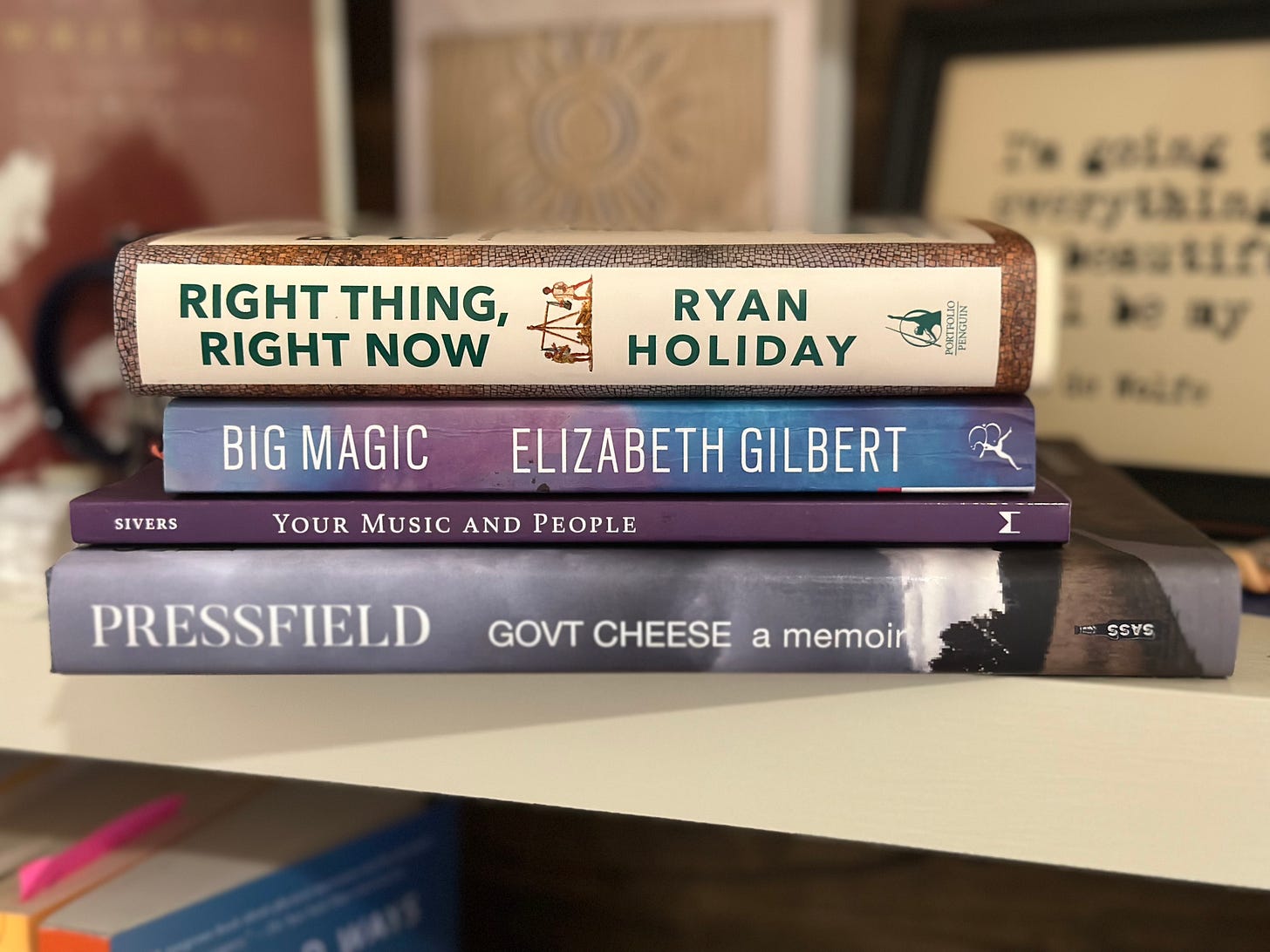You are not required to save the world with your creativity, your expression, your art.
On saving yourself (first)
In the book, Big Magic, Elizabeth Gilbert said that when anybody tells her they want to write a book to “help other people”, she thinks to herself “oh, please don’t.”
When I read this line, I actually laughed out loud.
I think we’re all guilty, at some point in time, of believing that our work, our art, our creations - in order to be valid - should have to help or be for other people. If not, we question their importance. We question time spent doing them. We try to intellectualize and measure their return on investment. But, that’s where we get confused. That’s where we often miss the point. We look outward.
Gilbert says:
“I would so much rather you wrote a book in order to entertain yourself - than to help me … I would prefer that you make your art in order to save yourself, or to relieve yourself of some great psychic burden, rather than to save or relieve us.”
She said when she wrote Big Magic, she wrote it for herself - finding that meditating on the topic of creativity was “enjoyable and useful.”
As I looked across the works and words of others, I found this perspective to be a common theme - the theme of shifting from outward to inward.
As a long-time reader of Ryan Holiday, I’ve often heard him refer to one of his favorite books, Meditations, written by Roman emperor Marcus Aurelius. Yet, it wasn’t until reading his book, Right Thing, Right Now, that I discovered that Meditations, as he put it, is “a notebook of reminders and motivational sayings he wrote to himself.”
In one of his summaries of Meditations, he describes it as a collection of “the private thoughts of the world’s most powerful man giving advice to himself on how to make good on the responsibilities and obligations of his positions.”
He goes on to say that one of the most unique things about this collection of the emperor’s writings is that they were written “for his own benefit, not for an audience” and that this may be a big part of their specialness - that “they were never intended for us to read.”
He said that “almost every other piece of literature is a kind of performance - made for an audience.” He said Meditations, however, was written for “personal clarity” not “public benefit” and the very act of writing down the Stoic exercises could be considered “a form of practicing them”, just as “repeating a prayer or hymn might be.”
Derek Sivers, in his book, Your Music and People, poses the question: “Valuable to others, or only you?”
His question refers to whether or not you choose to create things that YOU find valuable and meaningful (versus just for others). He says that if you decide to accept that your art, your creative expression, needs only to be valuable to you, then maybe “your conflicted mind can finally be at peace.”
Steven Pressfield, in his book Govt Cheese compares art to artifice - in that art (creativity, expression), in all its forms, often serves as a clever strategy for the artist (person) to turn their pain into a manageable vehicle for handling it and expressing it - often, he says, being “one remove (or more) away from the actual event” - allowing it to be expressed in an endurable way. He says,
“Your ordeal of expression is as valid as Shakespeare’s, or Milton’s, or Virginia Woolf’s.”
He said that when he was first trying to write, his primary goal was to save himself, by
“seeking the idiom, the phrasing, the tone of voice, that will let me express that agony that is eating my guts like cancer.”
In our pain, or even in just our daily dealings of life, Pressfield says:
“How do we endure pain? How do we transcend it?”
“We turn it into art.”
If we do decide to share it?
Sometimes, this art, this expression of our own pain, should we decide to share it, becomes “a gift to every heart who sees or hears it.”
In a final statement on creating things for yourself, Gilbert writes:
“Your own reasons to create are enough.” Merely by pursuing what you love, you may inadvertently end up helping us plenty. Do whatever brings you to life, then - follow your own fascinations, obsessions, and compulsions. Trust them. Create whatever causes a revolution in your heart.
The rest will take care of itself.”
“The place to improve the world is first in one’s own heart and head and hands, and then work outward from there.”
~ Robert M. Pirsig, On Quality


